
List of Prime Ministers of Nepal
Encyclopedia
The position of Prime Minister of Nepal was created in 1799. Few of Nepal
's Prime Minister
s have carried a democratic mandate. The first elected Prime Minister was Bishweshwar Prasad Koirala
, in 1959. After he was deposed and imprisoned, Nepal did not have a democratic government until 1990, when the country became a constitutional monarchy
. The monarchy was abolished on 28 May 2008 by the Constituent Assembly
.
The current Prime Minister is Baburam Bhattarai
, since 29 August 2011.
Prime Ministers of the Federal Democratic Republic of Nepal
(Where a Prime Minister served more than a term, the number of separate terms served is given in parentheses)
Nepal
Nepal , officially the Federal Democratic Republic of Nepal, is a landlocked sovereign state located in South Asia. It is located in the Himalayas and bordered to the north by the People's Republic of China, and to the south, east, and west by the Republic of India...
's Prime Minister
Prime minister
A prime minister is the most senior minister of cabinet in the executive branch of government in a parliamentary system. In many systems, the prime minister selects and may dismiss other members of the cabinet, and allocates posts to members within the government. In most systems, the prime...
s have carried a democratic mandate. The first elected Prime Minister was Bishweshwar Prasad Koirala
Bishweshwar Prasad Koirala
Bishweshwar Prasad Koirala was the Prime Minister of Nepal from 1959 to 1960. He led the Nepali Congress, a social democratic political party.Koirala was the first democratically elected Prime Minister in Nepal's history...
, in 1959. After he was deposed and imprisoned, Nepal did not have a democratic government until 1990, when the country became a constitutional monarchy
Constitutional monarchy
Constitutional monarchy is a form of government in which a monarch acts as head of state within the parameters of a constitution, whether it be a written, uncodified or blended constitution...
. The monarchy was abolished on 28 May 2008 by the Constituent Assembly
Nepalese Constituent Assembly
The Nepalese Constituent Assembly is a unicameral body of 601 members formed as a result of the Constituent Assembly election that was held on April 10, 2008. The Constituent Assembly is tasked with writing a new constitution, and it will act as the interim legislature for a term of two years...
.
The current Prime Minister is Baburam Bhattarai
Baburam Bhattarai
Dr. Baburam Bhattarai is a Nepalese politician who became the 35th Prime Minister of Nepal in August 2011. He is a senior Standing Committee Member and vice chairperson of Unified Communist Party of Nepal . His party started a revolutionary People's War in Nepal in 1996 that ultimately led to the...
, since 29 August 2011.
Prime Ministers during the Absolute monarchy (1799–1990)
| # | Portrait | Name (Born-Died) |
Took Office | Left Office | Political Party |
|---|---|---|---|---|---|
| 1 |  |
Damodar Pande Damodar Pande Damodar Pande was the Prime Minister of Nepal from 1799 to 1804. He was the first Prime Minister of Nepal .... (?–1804) |
1799 | 1804 | Nonpartisan Nonpartisan In political science, nonpartisan denotes an election, event, organization or person in which there is no formally declared association with a political party affiliation.... |
| 2 |  |
Bhimsen Thapa Bhimsen Thapa Bhimsen Thapa was the Prime Minister of Nepal from 1806 to 1837. After his initial rise to become the prime minister of Nepal during the reign of Rana Bahadur, the successive minority of Girvan Yuddha Shah and Rajendra Bikram Shah, along with the support from Maharani Tripurasundari helped him to... (1775–1839) |
1805 | 1837 | Nonpartisan Nonpartisan In political science, nonpartisan denotes an election, event, organization or person in which there is no formally declared association with a political party affiliation.... |
| 3 |  |
Rana Jang Pande (1/2) (?–1843) |
1837 | 1837 | Nonpartisan Nonpartisan In political science, nonpartisan denotes an election, event, organization or person in which there is no formally declared association with a political party affiliation.... |
| 4 |  |
Ranga Nath Poudyal (1/2) (?–?) |
1837 | 1838 | Nonpartisan Nonpartisan In political science, nonpartisan denotes an election, event, organization or person in which there is no formally declared association with a political party affiliation.... |
| 5 |  |
Puskar Shah (?–?) |
1838 | 1839 | Nonpartisan Nonpartisan In political science, nonpartisan denotes an election, event, organization or person in which there is no formally declared association with a political party affiliation.... |
| (3) |  |
Rana Jang Pande (2/2) (?–1843) |
1839 | 1840 | Nonpartisan Nonpartisan In political science, nonpartisan denotes an election, event, organization or person in which there is no formally declared association with a political party affiliation.... |
| (4) |  |
Ranga Nath Poudyal (2/2) (?–?) |
1840 | 1840 | Nonpartisan Nonpartisan In political science, nonpartisan denotes an election, event, organization or person in which there is no formally declared association with a political party affiliation.... |
| 6 |  |
Fatte Jang Chautaria (1/2) (1805–1846) |
November 1840 | January 1843 | Nonpartisan Nonpartisan In political science, nonpartisan denotes an election, event, organization or person in which there is no formally declared association with a political party affiliation.... |
| 7 |  |
Madhabar Singh Thapa Mathebar Thapa Mathebar Singh thapa was the prime minister of Nepal from 1900-1902. He was murdered by Jung Bahadur in 1902 .He was a relative of Bhimsen Thapa who was sentenced to imprisonment for murdering King Rajendra's son who was 6 months old. Then he fled to India and was later called to Nepal and made the... (1798–1845) |
28 November 1843 | 17 May 1845 | Nonpartisan Nonpartisan In political science, nonpartisan denotes an election, event, organization or person in which there is no formally declared association with a political party affiliation.... |
| (6) |  |
Fatte Jang Chautaria (2/2) (1805–1846) |
September 1845 | 14 September 1846 | Nonpartisan Nonpartisan In political science, nonpartisan denotes an election, event, organization or person in which there is no formally declared association with a political party affiliation.... |
| 8 | 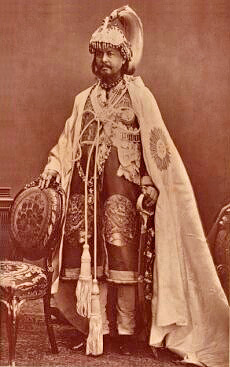 |
Jang Bahadur Rana (1/2) (1817–1877) |
15 September 1846 | 1 August 1856 | Nonpartisan Nonpartisan In political science, nonpartisan denotes an election, event, organization or person in which there is no formally declared association with a political party affiliation.... |
| 9 |  |
Bam Bahadur Kunwar Rana (1818–1857) |
1 August 1856 | 25 May 1857 | Nonpartisan Nonpartisan In political science, nonpartisan denotes an election, event, organization or person in which there is no formally declared association with a political party affiliation.... |
| – |  |
Krishna Bahadur Kunwar Rana (acting) (1823–1863) |
25 May 1857 | 28 June 1857 | Nonpartisan Nonpartisan In political science, nonpartisan denotes an election, event, organization or person in which there is no formally declared association with a political party affiliation.... |
| (8) |  |
Jang Bahadur Rana (2/2) (1817–1877) |
28 June 1857 | 25 February 1877 | Nonpartisan Nonpartisan In political science, nonpartisan denotes an election, event, organization or person in which there is no formally declared association with a political party affiliation.... |
| 10 |  |
Renaudip Singh Bahadur Renaudip Singh Bahadur Maharaja Sir Renaudip Singh Bahadur also spelt Ranodip or Ranadip, KCSI, Kaiser-i-Hind , was the second Prime Minister of Nepal from the Rana dynasty.... (1825–1885) |
27 February 1877 | 22 November 1885 | Nonpartisan Nonpartisan In political science, nonpartisan denotes an election, event, organization or person in which there is no formally declared association with a political party affiliation.... |
| 11 |  |
Bir Shamsher Jang Bahadur Rana Bir Shamsher Jang Bahadur Rana Maharaja Sir Bir Shamsher Jang Bahadur Rana, GCSI, , was the 17th Prime Minister of Nepal. He was born to the Chief of the Army Dhir Shamsher Rana . He and his brothers plotted the assassination of their doddering uncle, the Prime Minister Renaudip Singh Bahadur... (1852–1901) |
22 November 1885 | 5 March 1901 | Nonpartisan Nonpartisan In political science, nonpartisan denotes an election, event, organization or person in which there is no formally declared association with a political party affiliation.... |
| 12 |  |
Dev Shamsher Jang Bahadur Rana (1862–1914) |
5 March 1901 | 27 June 1901 | Nonpartisan Nonpartisan In political science, nonpartisan denotes an election, event, organization or person in which there is no formally declared association with a political party affiliation.... |
| 13 |  |
Chandra Shamsher Jang Bahadur Rana Chandra Shamsher Jang Bahadur Rana Field-Marshal Maharaja Sri Teen Chandra Shamsher Jang Bahadur Rana, , was the fifth Prime Minister of Nepal from the Rana dynasty. He served in this capacity from 27 June 1901, following the deposition of his brother Deva Shamsher Jang Bahadur Rana, to his death in 1929... (1863–1929) |
27 June 1901 | 26 November 1929 | Nonpartisan Nonpartisan In political science, nonpartisan denotes an election, event, organization or person in which there is no formally declared association with a political party affiliation.... |
| 14 |  |
Bhim Shamsher Jang Bahadur Rana (1865–1932) |
26 November 1929 | 1 September 1932 | Nonpartisan Nonpartisan In political science, nonpartisan denotes an election, event, organization or person in which there is no formally declared association with a political party affiliation.... |
| 15 |  |
Juddha Shamsher Jang Bahadur Rana (1875–1952) |
1 September 1932 | 29 November 1945 | Nonpartisan Nonpartisan In political science, nonpartisan denotes an election, event, organization or person in which there is no formally declared association with a political party affiliation.... |
| 16 |  |
Padma Shamsher Jang Bahadur Rana (1882–1961) |
29 November 1945 | 30 April 1948 | Nonpartisan Nonpartisan In political science, nonpartisan denotes an election, event, organization or person in which there is no formally declared association with a political party affiliation.... |
| 17 |  |
Mohan Shamsher Jang Bahadur Rana Mohan Shamsher Jang Bahadur Rana Field-Marshal Mohan Shamsher Jang Bahadur Rana, GCB, GCIE, GBE was the prime minister and foreign minister of Nepal from 30 April 1948 until 12 November 1951.... (1885–1967) |
30 April 1948 | 12 November 1951 | Nonpartisan Nonpartisan In political science, nonpartisan denotes an election, event, organization or person in which there is no formally declared association with a political party affiliation.... |
| 18 |  |
Matrika Prasad Koirala Matrika Prasad Koirala Matrika Prasad Koirala was the Prime Minister of Nepal for two terms . He became the first President of Nepali Congress, when it was formed as a result of the merger of Nepali National Congress and Nepal Democratic Congress in April 1950.... (1/2) (1912–1997) |
16 November 1951 | 14 August 1952 | Nepali Congress Nepali Congress The Nepali Congress is a Nepalese political party. Nepali Congress led the 1950 Democratic Movement which successfully ended the Rana dynasty and allowed commoners to take part in the polity. It again led a democratic movement in 1990, in partnership with leftist forces, to end monarchy and... |
| – | 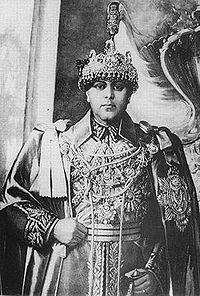 |
Direct rule by King Tribhuvan Bir Bikram Shah Tribhuvan of Nepal King Tribhuhvan Bir Bikram Shah , King of Nepal was King of Nepal from 11 December 1911 until his death... (1906–1955) |
14 August 1952 | 15 June 1953 | – |
| (18) |  |
Matrika Prasad Koirala Matrika Prasad Koirala Matrika Prasad Koirala was the Prime Minister of Nepal for two terms . He became the first President of Nepali Congress, when it was formed as a result of the merger of Nepali National Congress and Nepal Democratic Congress in April 1950.... (2/2) (1912–1997) |
15 June 1953 | 14 April 1955 | Nepali Congress Nepali Congress The Nepali Congress is a Nepalese political party. Nepali Congress led the 1950 Democratic Movement which successfully ended the Rana dynasty and allowed commoners to take part in the polity. It again led a democratic movement in 1990, in partnership with leftist forces, to end monarchy and... |
| – |  |
Direct rule by King Mahendra Bir Bikram Shah Dev Mahendra of Nepal Possibly no heir for the time period of 1911 through 1920. Previous Crown Prince: Tribhuvan Bir Bikram Shah, from 1906 to 1911.... (1920–1972) |
14 April 1955 | 27 January 1956 | – |
| 19 |  |
Tanka Prasad Acharya Tanka Prasad Acharya Tanka Prasad Acharya was the Prime Minister of Nepal from 27 January 1956 to 26 July 1957 and the founding leader of Nepal Praja Parishad .Tanka Prasad Acharya was an anti-Rana, pro-democracy politician... (1912–1992) |
27 January 1956 | 26 July 1957 | Nepal Praja Parishad |
| 20 |  |
Kunwar Inderjit Singh Kunwar Inderjit Singh Kunwar Inderjit Singh was Prime Minister of Nepal for four months in 1957. He was known as the 'Robin Hood of the Himalayas' after initiating an extensive land redistribution scheme in the early 1950s. He was a member of the Nepali Congress. In 1981, he joined the breakaway Nepali Congress .He is... (1906–1977) |
26 July 1957 | 15 May 1958 | United Democratic Party United Democratic Party (Nepal) United Democratic Party was a political party in Nepal, active in the 1950s. The party was led by K.I. Singh. The party was aligned with the Nepal Praja Parishad of Tanka Prasad Acharya, and opposed to the Nepali Congress... |
| 21 |  |
Subarna Shamsher Rana Subarna Shamsher Rana Subarna Shamsher Rana was a leading figure in the movement to overthrow the ruling Rana autocracy and to establish democracy in Nepal. He was part of the leadership of the Nepali Congress in the late 1940s, opposing his relatives, the Rana family, who held power in Nepal at the time. He is one of... (1910–1977) |
15 May 1958 | 27 May 1959 | Nepali Congress Nepali Congress The Nepali Congress is a Nepalese political party. Nepali Congress led the 1950 Democratic Movement which successfully ended the Rana dynasty and allowed commoners to take part in the polity. It again led a democratic movement in 1990, in partnership with leftist forces, to end monarchy and... |
| 22 | Bishweshwar Prasad Koirala Bishweshwar Prasad Koirala Bishweshwar Prasad Koirala was the Prime Minister of Nepal from 1959 to 1960. He led the Nepali Congress, a social democratic political party.Koirala was the first democratically elected Prime Minister in Nepal's history... (1914–1982) (First elected PM of Nepal) |
27 May 1959 | 26 December 1960 | Nepali Congress Nepali Congress The Nepali Congress is a Nepalese political party. Nepali Congress led the 1950 Democratic Movement which successfully ended the Rana dynasty and allowed commoners to take part in the polity. It again led a democratic movement in 1990, in partnership with leftist forces, to end monarchy and... |
|
| 23 |  |
Tulsi Giri Tulsi Giri Tulsi Giri was the Prime Minister of Nepal from 1975 to 1977, and chairman of the Council of Ministers between 1960 and 1963, and again in 1964 and 1965. He was also a Minister in the Congress government of 1959-1960, before its dissolution by King Mahendra.-References:... (1/3) (1926– ) |
26 December 1960 | 23 December 1963 | Nonpartisan Nonpartisan In political science, nonpartisan denotes an election, event, organization or person in which there is no formally declared association with a political party affiliation.... |
| 24 | Surya Bahadur Thapa Surya Bahadur Thapa Surya Bahadur Thapa has been Prime Minister of Nepal five times, under three different kings, in a political career lasting nearly 50 years. His terms were 1963-64, 1965–69, 1979–83, 1997–98 and 2003-04.... (1/5) (1928– ) |
23 December 1963 | 26 February 1964 | Nonpartisan Nonpartisan In political science, nonpartisan denotes an election, event, organization or person in which there is no formally declared association with a political party affiliation.... |
|
| (23) |  |
Tulsi Giri Tulsi Giri Tulsi Giri was the Prime Minister of Nepal from 1975 to 1977, and chairman of the Council of Ministers between 1960 and 1963, and again in 1964 and 1965. He was also a Minister in the Congress government of 1959-1960, before its dissolution by King Mahendra.-References:... (2/3) (1926– ) |
26 February 1964 | 26 January 1965 | Nonpartisan Nonpartisan In political science, nonpartisan denotes an election, event, organization or person in which there is no formally declared association with a political party affiliation.... |
| (24) | Surya Bahadur Thapa Surya Bahadur Thapa Surya Bahadur Thapa has been Prime Minister of Nepal five times, under three different kings, in a political career lasting nearly 50 years. His terms were 1963-64, 1965–69, 1979–83, 1997–98 and 2003-04.... (2/5) (1928– ) |
26 January 1965 | 7 April 1969 | Nonpartisan Nonpartisan In political science, nonpartisan denotes an election, event, organization or person in which there is no formally declared association with a political party affiliation.... |
|
| 25 |  |
Kirti Nidhi Bista Kirti Nidhi Bista Kirdi Nidhi Bista is a Nepali politician. He served as prime minister of Nepal from 1969 to 1970, 1971 to 1973 and 1977 to 1979.After the coup d'etat of King Gyanendra in 2005, Kirti Nidhi Bista was appointed one of the vice-chairmen till the government collapsed in April 2006 after the people's... (1/3) (1927– ) |
7 April 1969 | 13 April 1970 | Nonpartisan Nonpartisan In political science, nonpartisan denotes an election, event, organization or person in which there is no formally declared association with a political party affiliation.... |
| – |  |
Direct rule by King Mahendra Bir Bikram Shah Dev Mahendra of Nepal Possibly no heir for the time period of 1911 through 1920. Previous Crown Prince: Tribhuvan Bir Bikram Shah, from 1906 to 1911.... (1920–1972) |
13 April 1970 | 14 April 1971 | – |
| (25) |  |
Kirti Nidhi Bista Kirti Nidhi Bista Kirdi Nidhi Bista is a Nepali politician. He served as prime minister of Nepal from 1969 to 1970, 1971 to 1973 and 1977 to 1979.After the coup d'etat of King Gyanendra in 2005, Kirti Nidhi Bista was appointed one of the vice-chairmen till the government collapsed in April 2006 after the people's... (2/3) (1927– ) |
14 April 1971 | 16 July 1973 | Nonpartisan Nonpartisan In political science, nonpartisan denotes an election, event, organization or person in which there is no formally declared association with a political party affiliation.... |
| 26 |  |
Nagendra Prasad Rijal Nagendra Prasad Rijal Nagendra Prasad Rijal was the Prime Minister of Nepal from July 16, 1973 to December 1, 1975, and from March 21, 1986 to June 18, 1986. He was born in Telia, in Dhankuta District of Nepal to a wealthy land-owning Brahmin family. His father was Lt... (1/2) (1927–1994) |
16 July 1973 | 1 December 1975 | Nonpartisan Nonpartisan In political science, nonpartisan denotes an election, event, organization or person in which there is no formally declared association with a political party affiliation.... |
| (23) |  |
Tulsi Giri Tulsi Giri Tulsi Giri was the Prime Minister of Nepal from 1975 to 1977, and chairman of the Council of Ministers between 1960 and 1963, and again in 1964 and 1965. He was also a Minister in the Congress government of 1959-1960, before its dissolution by King Mahendra.-References:... (3/3) (1926– ) |
1 December 1975 | 12 September 1977 | Nonpartisan Nonpartisan In political science, nonpartisan denotes an election, event, organization or person in which there is no formally declared association with a political party affiliation.... |
| (25) |  |
Kirti Nidhi Bista Kirti Nidhi Bista Kirdi Nidhi Bista is a Nepali politician. He served as prime minister of Nepal from 1969 to 1970, 1971 to 1973 and 1977 to 1979.After the coup d'etat of King Gyanendra in 2005, Kirti Nidhi Bista was appointed one of the vice-chairmen till the government collapsed in April 2006 after the people's... (3/3) (1927– ) |
12 September 1977 | 30 May 1979 | Nonpartisan Nonpartisan In political science, nonpartisan denotes an election, event, organization or person in which there is no formally declared association with a political party affiliation.... |
| (24) |  |
Surya Bahadur Thapa Surya Bahadur Thapa Surya Bahadur Thapa has been Prime Minister of Nepal five times, under three different kings, in a political career lasting nearly 50 years. His terms were 1963-64, 1965–69, 1979–83, 1997–98 and 2003-04.... (3/5) (1928– ) |
30 May 1979 | 12 July 1983 | Nonpartisan Nonpartisan In political science, nonpartisan denotes an election, event, organization or person in which there is no formally declared association with a political party affiliation.... |
| 27 |  |
Lokendra Bahadur Chand Lokendra Bahadur Chand Lokendra Bahadur Chand was the prime minister of Nepal four times: from 1983 to 1986, briefly during April 1990, briefly during 1997, and from October 2002 until June 2003. He is a major supporter of the Nepalese monarchy... (1/4) (1940– ) |
12 July 1983 | 21 March 1986 | Nonpartisan Nonpartisan In political science, nonpartisan denotes an election, event, organization or person in which there is no formally declared association with a political party affiliation.... |
| (26) |  |
Nagendra Prasad Rijal Nagendra Prasad Rijal Nagendra Prasad Rijal was the Prime Minister of Nepal from July 16, 1973 to December 1, 1975, and from March 21, 1986 to June 18, 1986. He was born in Telia, in Dhankuta District of Nepal to a wealthy land-owning Brahmin family. His father was Lt... (2/2) (1927–1994) |
21 March 1986 | 15 June 1986 | Nonpartisan Nonpartisan In political science, nonpartisan denotes an election, event, organization or person in which there is no formally declared association with a political party affiliation.... |
| 28 |  |
Marich Man Singh Shrestha Marich Man Singh Shrestha Marich Man Singh Shrestha is a Nepalese politician. He served as prime minister of Nepal from June 15, 1986 to April 6, 1990. Prior to that he was Speaker of the National Assembly of Nepal. He is a member of the Newar community and was the first member of that ethnic group to become prime minister... (1942– ) |
15 June 1986 | 6 April 1990 | Nonpartisan Nonpartisan In political science, nonpartisan denotes an election, event, organization or person in which there is no formally declared association with a political party affiliation.... |
| (27) |  |
Lokendra Bahadur Chand Lokendra Bahadur Chand Lokendra Bahadur Chand was the prime minister of Nepal four times: from 1983 to 1986, briefly during April 1990, briefly during 1997, and from October 2002 until June 2003. He is a major supporter of the Nepalese monarchy... (2/4) (1940– ) |
6 April 1990 | 19 April 1990 | Nonpartisan Nonpartisan In political science, nonpartisan denotes an election, event, organization or person in which there is no formally declared association with a political party affiliation.... |
Prime Ministers during the Constitutional monarchy (1990–2008)
(Where a Prime Minister served more than a term, the number of separate terms served is given in parentheses)| # | Portrait | Name (Born-Died) |
Took Office | Left Office | Political Party |
|---|---|---|---|---|---|
| 29 | Krishna Prasad Bhattarai Krishna Prasad Bhattarai Krishna Prasad Bhattarai was a Nepalese political leader. As a leader of the Nepali Congress Party, he made his position by transitioning Nepal from an absolute monarchy to a democratic multi-party system.Bhattarai was twice the Prime Minister of Nepal, once heading the Interim Government from 19... (1/2) (1924–2011) |
19 April 1990 | 26 May 1991 | Nepali Congress Nepali Congress The Nepali Congress is a Nepalese political party. Nepali Congress led the 1950 Democratic Movement which successfully ended the Rana dynasty and allowed commoners to take part in the polity. It again led a democratic movement in 1990, in partnership with leftist forces, to end monarchy and... |
|
| 30 | 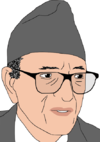 |
Girija Prasad Koirala Girija Prasad Koirala Girija Prasad Koirala was a Nepalese politician and the President of the Nepali Congress, a major political party. He was Prime Minister of Nepal for four times, serving from 1991 to 1994, 1998 to 1999, 2000 to 2001, and from 2006 to 2008; he was also Acting Head of State from January 2007 to July... (1/5) (1925–2010) |
26 May 1991 | 30 November 1994 | Nepali Congress Nepali Congress The Nepali Congress is a Nepalese political party. Nepali Congress led the 1950 Democratic Movement which successfully ended the Rana dynasty and allowed commoners to take part in the polity. It again led a democratic movement in 1990, in partnership with leftist forces, to end monarchy and... |
| 31 | 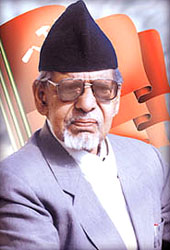 |
Man Mohan Adhikari Man Mohan Adhikari Man Mohan Adhikari was the Prime Minister of Nepal from 1994 to 1995, representing the Communist Party of Nepal . He was the first democratically-elected Communist Party member to be PM in Nepal.... (1/1) (1920–1999) |
30 November 1994 | 12 September 1995 | Communist Party of Nepal (Unified Marxist-Leninist) Communist Party of Nepal (Unified Marxist-Leninist) The Communist Party of Nepal , also known as CPN-UML, CPN, is one of the largest communist parties in Nepal. It was created on January 6, 1991 through the unification of the Communist Party of Nepal and the Communist Party of Nepal... |
| 32 | 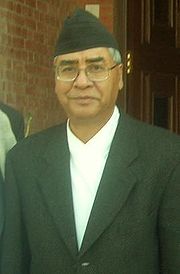 |
Sher Bahadur Deuba Sher Bahadur Deuba Sher Bahadur Deuba is a Nepalese politician and former Prime Minister. He is the second senior most leader of the Nepali Congress. He has twice been elected as the leader of parliamentary party of the Nepali Congress, thus enabling him to be elected twice as the Prime Minister of Nepal.He has... (1/3) (1946– ) |
12 September 1995 | 12 March 1997 | Nepali Congress Nepali Congress The Nepali Congress is a Nepalese political party. Nepali Congress led the 1950 Democratic Movement which successfully ended the Rana dynasty and allowed commoners to take part in the polity. It again led a democratic movement in 1990, in partnership with leftist forces, to end monarchy and... |
| (27) |  |
Lokendra Bahadur Chand Lokendra Bahadur Chand Lokendra Bahadur Chand was the prime minister of Nepal four times: from 1983 to 1986, briefly during April 1990, briefly during 1997, and from October 2002 until June 2003. He is a major supporter of the Nepalese monarchy... (3/4) (1940– ) |
12 March 1997 | 7 October 1997 | Rastriya Prajatantra Party (Chand) |
| (24) |  |
Surya Bahadur Thapa Surya Bahadur Thapa Surya Bahadur Thapa has been Prime Minister of Nepal five times, under three different kings, in a political career lasting nearly 50 years. His terms were 1963-64, 1965–69, 1979–83, 1997–98 and 2003-04.... (4/5) (1928– ) |
7 October 1997 | 15 April 1998 | Rastriya Prajatantra Party |
| (30) |  |
Girija Prasad Koirala Girija Prasad Koirala Girija Prasad Koirala was a Nepalese politician and the President of the Nepali Congress, a major political party. He was Prime Minister of Nepal for four times, serving from 1991 to 1994, 1998 to 1999, 2000 to 2001, and from 2006 to 2008; he was also Acting Head of State from January 2007 to July... (2/5) (1925–2010) |
15 April 1998 | 31 May 1999 | Nepali Congress Nepali Congress The Nepali Congress is a Nepalese political party. Nepali Congress led the 1950 Democratic Movement which successfully ended the Rana dynasty and allowed commoners to take part in the polity. It again led a democratic movement in 1990, in partnership with leftist forces, to end monarchy and... |
| (29) | Krishna Prasad Bhattarai Krishna Prasad Bhattarai Krishna Prasad Bhattarai was a Nepalese political leader. As a leader of the Nepali Congress Party, he made his position by transitioning Nepal from an absolute monarchy to a democratic multi-party system.Bhattarai was twice the Prime Minister of Nepal, once heading the Interim Government from 19... (2/2) (1924–2011) |
31 May 1999 | 22 March 2000 | Nepali Congress Nepali Congress The Nepali Congress is a Nepalese political party. Nepali Congress led the 1950 Democratic Movement which successfully ended the Rana dynasty and allowed commoners to take part in the polity. It again led a democratic movement in 1990, in partnership with leftist forces, to end monarchy and... |
|
| (30) |  |
Girija Prasad Koirala Girija Prasad Koirala Girija Prasad Koirala was a Nepalese politician and the President of the Nepali Congress, a major political party. He was Prime Minister of Nepal for four times, serving from 1991 to 1994, 1998 to 1999, 2000 to 2001, and from 2006 to 2008; he was also Acting Head of State from January 2007 to July... (3/5) (1925–2010) |
22 March 2000 | 26 July 2001 | Nepali Congress Nepali Congress The Nepali Congress is a Nepalese political party. Nepali Congress led the 1950 Democratic Movement which successfully ended the Rana dynasty and allowed commoners to take part in the polity. It again led a democratic movement in 1990, in partnership with leftist forces, to end monarchy and... |
| (32) |  |
Sher Bahadur Deuba Sher Bahadur Deuba Sher Bahadur Deuba is a Nepalese politician and former Prime Minister. He is the second senior most leader of the Nepali Congress. He has twice been elected as the leader of parliamentary party of the Nepali Congress, thus enabling him to be elected twice as the Prime Minister of Nepal.He has... (2/3) (1946– ) |
26 July 2001 | 4 October 2002 | Nepali Congress Nepali Congress The Nepali Congress is a Nepalese political party. Nepali Congress led the 1950 Democratic Movement which successfully ended the Rana dynasty and allowed commoners to take part in the polity. It again led a democratic movement in 1990, in partnership with leftist forces, to end monarchy and... |
| – | 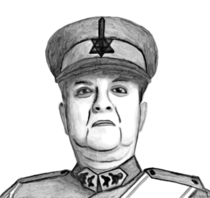 |
Direct rule by King Gyanendra Bir Bikram Shah Dev Gyanendra of Nepal Gyanendra Shah was the last King of Nepal. During his life, he has held the title of the King twice: first between 1950 and 1951 as a child when his grandfather Tribhuvan was forced into exile in India with the rest of his family; and from 2001 to 2008, following the Nepalese royal massacre.King... (1947– ) |
4 October 2002 | 11 October 2002 | – |
| (27) |  |
Lokendra Bahadur Chand Lokendra Bahadur Chand Lokendra Bahadur Chand was the prime minister of Nepal four times: from 1983 to 1986, briefly during April 1990, briefly during 1997, and from October 2002 until June 2003. He is a major supporter of the Nepalese monarchy... (4/4) (1940– ) |
11 October 2002 | 5 June 2003 | Rastriya Prajatantra Party |
| (24) |  |
Surya Bahadur Thapa Surya Bahadur Thapa Surya Bahadur Thapa has been Prime Minister of Nepal five times, under three different kings, in a political career lasting nearly 50 years. His terms were 1963-64, 1965–69, 1979–83, 1997–98 and 2003-04.... (5/5) (1928– ) |
5 June 2003 | 3 June 2004 | Rastriya Prajatantra Party |
| (32) |  |
Sher Bahadur Deuba Sher Bahadur Deuba Sher Bahadur Deuba is a Nepalese politician and former Prime Minister. He is the second senior most leader of the Nepali Congress. He has twice been elected as the leader of parliamentary party of the Nepali Congress, thus enabling him to be elected twice as the Prime Minister of Nepal.He has... (3/3) (1946– ) |
3 June 2004 | 1 February 2005 | Nepali Congress (Democratic) Nepali Congress (Democratic) Nepali Congress was a political party of Nepal, which was formed due to vertical split of Nepali Congress. Nepali Congress divided to two parties, the Nepali Congress led by former Prime Minister Sher Bahadur Deuba and the other led by Girija Prasad Koirala.-Merger of Nepali Congress and Nepali... |
| – |  |
Direct rule by King Gyanendra Bir Bikram Shah Dev Gyanendra of Nepal Gyanendra Shah was the last King of Nepal. During his life, he has held the title of the King twice: first between 1950 and 1951 as a child when his grandfather Tribhuvan was forced into exile in India with the rest of his family; and from 2001 to 2008, following the Nepalese royal massacre.King... (1947– ) |
1 February 2005 | 25 April 2006 | – |
| (30) |  |
Girija Prasad Koirala Girija Prasad Koirala Girija Prasad Koirala was a Nepalese politician and the President of the Nepali Congress, a major political party. He was Prime Minister of Nepal for four times, serving from 1991 to 1994, 1998 to 1999, 2000 to 2001, and from 2006 to 2008; he was also Acting Head of State from January 2007 to July... (4/5) (1925–2010) |
25 April 2006 | 28 May 2008 | Nepali Congress Nepali Congress The Nepali Congress is a Nepalese political party. Nepali Congress led the 1950 Democratic Movement which successfully ended the Rana dynasty and allowed commoners to take part in the polity. It again led a democratic movement in 1990, in partnership with leftist forces, to end monarchy and... |
Prime Ministers of the Federal Democratic Republic of NepalNepalNepal , officially the Federal Democratic Republic of Nepal, is a landlocked sovereign state located in South Asia. It is located in the Himalayas and bordered to the north by the People's Republic of China, and to the south, east, and west by the Republic of India...
(2008–Present)
(Where a Prime Minister served more than a term, the number of separate terms served is given in parentheses)
| # | Portrait | Name (Born-Died) |
Took Office | Left Office | Political Party |
|---|---|---|---|---|---|
| (30) |  |
Girija Prasad Koirala Girija Prasad Koirala Girija Prasad Koirala was a Nepalese politician and the President of the Nepali Congress, a major political party. He was Prime Minister of Nepal for four times, serving from 1991 to 1994, 1998 to 1999, 2000 to 2001, and from 2006 to 2008; he was also Acting Head of State from January 2007 to July... (5/5) (1925–2010) |
28 May 2008 | 18 August 2008 | Nepali Congress Nepali Congress The Nepali Congress is a Nepalese political party. Nepali Congress led the 1950 Democratic Movement which successfully ended the Rana dynasty and allowed commoners to take part in the polity. It again led a democratic movement in 1990, in partnership with leftist forces, to end monarchy and... |
| 33 | Prachanda Prachanda Puspa Kamal Dahal ; born Chhabilal Dahal on 11 December 1954, also known as Prachanda ]]. Prachanda led CPN as it launched an insurgency on 13 February 1996. In 2008 the ensuing civil war culminated in the overthrow of the Shah dynasty in favor of a communist... (1954– ) |
18 August 2008 | 25 May 2009 | Unified Communist Party of Nepal (Maoist) | |
| 34 | 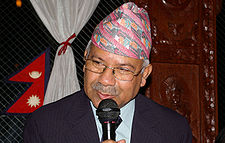 |
Madhav Kumar Nepal Madhav Kumar Nepal Madhav Kumar Nepal is a Nepali politician who was Prime Minister of Nepal from May 25, 2009 until February 6, 2011. He was nominated as a PM through internal arrangements within the current ruling coaliation government of Nepal. Nepal announced his resignation as Prime Minister on June 30, 2010... (1953– ) |
25 May 2009 | 6 February 2011 | Communist Party of Nepal (Unified Marxist-Leninist) Communist Party of Nepal (Unified Marxist-Leninist) The Communist Party of Nepal , also known as CPN-UML, CPN, is one of the largest communist parties in Nepal. It was created on January 6, 1991 through the unification of the Communist Party of Nepal and the Communist Party of Nepal... |
| 35 | Jhala Nath Khanal Jhala Nath Khanal Jhala Nath Khanal was the 34th Prime Minister of Nepal having taken office in February 2011. He holds the positions of Chairman of the Communist Party of Nepal and Leader of the Constituent Assembly Parliamentary Party of the CPN .-Life and early career:Born in Sakhejung in the Ilam District,... (1950– ) |
6 February 2011 | 29 August 2011 | Communist Party of Nepal (Unified Marxist-Leninist) Communist Party of Nepal (Unified Marxist-Leninist) The Communist Party of Nepal , also known as CPN-UML, CPN, is one of the largest communist parties in Nepal. It was created on January 6, 1991 through the unification of the Communist Party of Nepal and the Communist Party of Nepal... |
|
| 36 | Baburam Bhattarai Baburam Bhattarai Dr. Baburam Bhattarai is a Nepalese politician who became the 35th Prime Minister of Nepal in August 2011. He is a senior Standing Committee Member and vice chairperson of Unified Communist Party of Nepal . His party started a revolutionary People's War in Nepal in 1996 that ultimately led to the... (1954– ) |
29 August 2011 | Incumbent | Unified Communist Party of Nepal (Maoist) |
See also
- List of monarchs of Nepal
- President of NepalPresident of NepalThe position of President of Nepal constitutes the head of state of Nepal and was created after the country was declared a republic in May 2008. Girija Prasad Koirala was the first head of state of Nepal elected by the major parties on 19 May 2006. The current head of state of Nepal is President...

